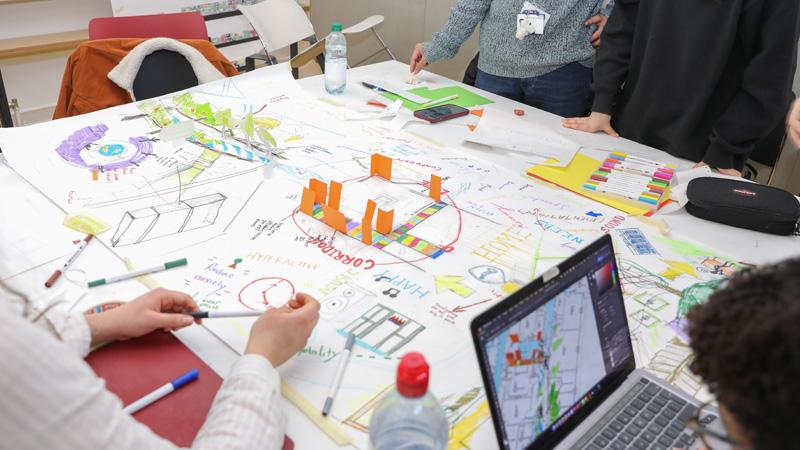For the second year running, the School of Architecture + Cities hosted a co-design workshop with Imperial College London’s Faculty for Medicine focused on mental health, design and wellbeing.

The Co-Design Workshop is a cross-disciplinary collaboration between the Faculty for Medicine at Imperial College London and the School of Architecture + Cities, which explored the relationship between design, mental health and wellbeing. The collaboration involved 650 students from across six courses including: Architecture BA Honours, Architecture & Environmental Design BSc Honours, Interior Architecture BA Honours, Architectural Technology BSc Honours, Master or Architecture (MArch) (RIBA Pt II) and BSc Medicine.
Over 40 colleagues from Westminster and Imperial College London also took part in the workshop. Co-design offers an immersive and experimental learning experience and challenges the conventional pedagogy of designer-client / expert-user by introducing experts by experience.
This innovative project comprised of two one-day co-design workshops, during which 64 cross-disciplinary groups of students reflected on four defined mental health conditions to identify problems and propose solutions for the design existing NHS mental healthcare sites.
The workshops were designed as a series of tangible tasks that stimulated discussion and restated the importance of ‘hands-on skills’ in both medicine and architecture. These included asking groups to create word clouds of what co-production meant to them, image-mapping emotional responses onto different sites, and representing in modelling clay what an ideal mental healthcare space should smell, feel, sound, and taste like.
The discussions these activities generated were summarised into a ‘user brief’ at the end of the first workshop, and then underpinned a design poster made in the second workshop, illustrating students’ creative response to the brief. Both workshops involved keynote speakers, interviews with clinicians, patients, carers and other service users, as well as a live Q&A panels offering feedback from architects, clinicians, and patient advocates. Due to the pandemic, last year’s workshop was run online, however this year the workshop ran in person in the architecture studios at Westminster.
Ambitious in scale and provocative, the Mental Health, Design and Wellbeing: Co-design Workshop taught everybody that a key part of being an architect or a clinician is the ability to listen with care and work collaboratively.
Talking about the workshop, Dr Ro Spankie, Principal Lecturer and Subject Lead for Interior Architecture, said: “After two years of lockdowns and restrictions it feels amazing to have pulled off a live event on such a scale. It was hard to get a sense of the enormity of it because the 650 students and 40+ staff involved worked in studio bubbles – but on one thing everyone agreed – co-design works best in person.”
Brandon Clark, a third-year student from the Architecture BA Honours course who participated in the workshop, added: “Overall, the workshop was a great collaboration and a fantastic learning experience for me. It was a great test of skills to get a group of medical students engaged in the design process and also to incorporate their expertise first-hand into the process. This felt like a sneak peek into our future careers where I imagine coproduction will become an integral part of design.”
View the design posters from last year’s co-design workshop.
Find out more about Architecture, Interiors and Urban Design courses at the University of Westminster.


